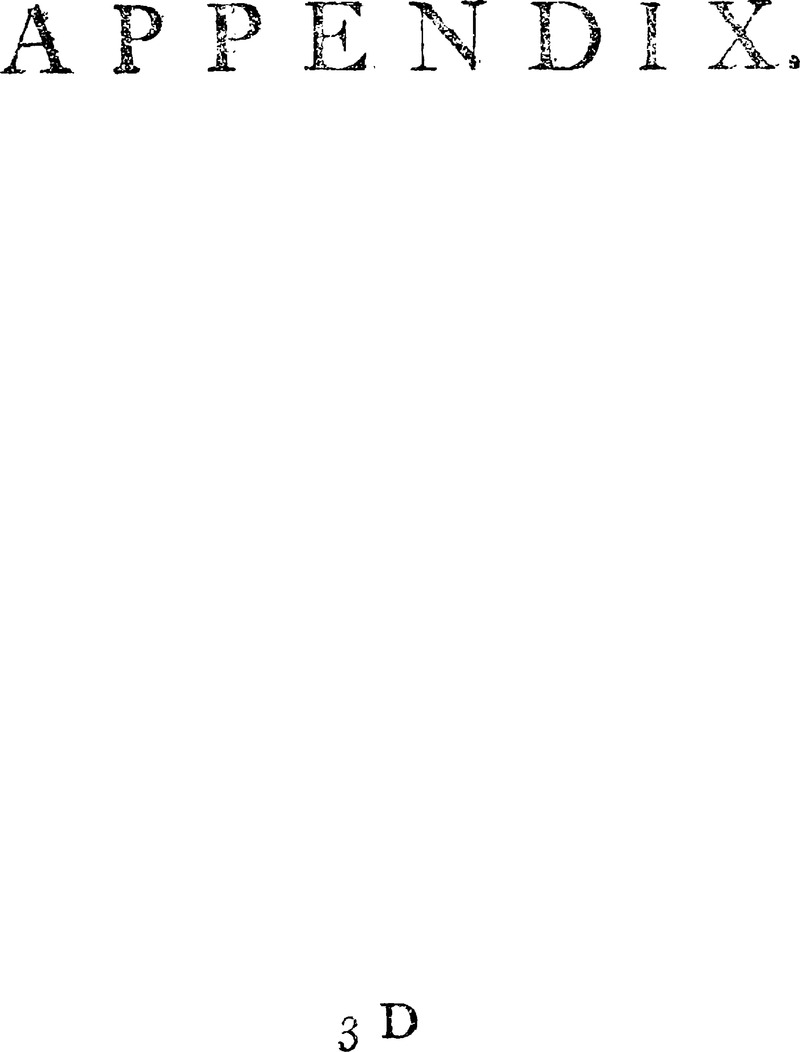No CrossRef data available.
Article contents
Appendix
Published online by Cambridge University Press: 24 July 2012
Abstract

- Type
- Appendix
- Information
- Copyright
- Copyright © The Society of Antiquaries of London 1806
References
page 390 note [a] Canopus where the stone was set up possessed the most famous temple of the god Serapis, and on that account might be called his country, or the country of the gods, if we suppose the word Θeon as it now stands, to be put for ϑεῶν, which is unlikely, and more probably by the slip of the graver for ΘΕΟΥ.
page 391 note [b] See Horsley's Brit. Rom. p. 35. 89. 250, &c.
page 392 note [c] These urns are represented in Pl. XXIX. they were afterwards presented by the Earl of Dartmouth, to the British Museum.
A curious glass urn was found on Blackheath, about the middle of the last century. See Hasted's Kent, vol. i. p. 27.
page 393 note [a] These are figured in Plates XXX, XXXI, XXXII, and XXXIII.
page 394 note [b] The common people in Ireland are particularly superstitious about these stones, which they fancy to be charms, thrown by the fairies, and only to be found by their favourites; and that whoever is in possession of one of them has the power of curing any disease by putting it into any liquid of which the patient is to drink three times.
page 396 note [c] Embracerye is a law term, and designates the offence of him, who endeavours to tamper with, or overawe a jury.
page 397 note [d] This Guido Ubaldo, Duke of Urbino, was elected a knight companion of the order of the garter, by king Henry 7th, and occurs as the 257th in number of the persons elected. See the British Compendium, Vol. ii. p. 295.
page 397 note [e] Dacium, Tribute.
page 397 note [f] Fundinavi, Ship-duty.
page 398 note [g] In the inquisition taken after the death of this John de Warblynton (Escaet 49 Edw. III. in Turri Lond. where he is called Warbulton) it was found that he held the manor of Shirfield, by the service here mentioned, and the same was found on the death of his widow Katherine, Esch. 5. Hen. IV. but in Esch. 8 Edw. IV. on the death of William Warbleton, Esq. this tenure is not mentioned. At an earlier period in Esch. 10 Edw. II. on the death of Thomas de Warblyngton, father of the grantee in these letters patent, it was found by the jury that he held the manor of Shirfield of the king in capite in free socage, as of his manor of Odiham, by the service of doing suit at the hundred court of Odiham, and of entertaining the bailiff of Odiham twice a year for holding two leets. At the bottom of the last mentioned inquisition is the following entry by the Eschaetor, “Qualitercunq, cõtineatr in ista inquisitione in libro feodor' de feccio invenitr sie. Wills Warblyngton tenet Shirfeld p s'janciā marischaucie in domo ℞ aliam tamen inquisitioẽm hẽre non potui.”
“Et postea venit p'fats Joħes in Canc' d'ni ℞ apud Wynton xiiij die Marcii anno &c. xo & ret' qd tenet man'iũ de Shirfeld p s'janciā Marischaufiæ portandi unā virgā in hospicio Dñi cum fup hoc fu'rit requis.”
It has been supposed that the word meretrices in this tenure is not to be understood in its literal sense, but as synonymous to lotrices or puellas; and some very ingenious and plausible arguments are employed to that effect, by the late Mr. Manning, in his History of Surrey; it seems clear nevertheless from the following passage in the liber Ruber Scaccarii, (cited by Sir Henry Spelman in his glossary in verbo Marescallus) that the word is to be taken in its literal sense. “Et si soloit estre que le Maresscal devoit avoir douze Damoisellez a la Court le Roy, qui devioient faire seirement a son Bacheler, qu'elles ne fauveroient aultres putains a la court qu'elles mesmes, ne Ribaudes fans avowerie de assie; ne laron ne mesel quelles ne les monsteront au Maresscal; et il doit pouvoir la Court de tout.”
page 401 note [h] See Mr. Townsend's Paper on this subject, p. 380.
page 403 note [i] On one side of his head appears the Jacob's staff, or cross staff, on one side of his face, and the equinoctial dial in his right hand, with the date of 1620, which dial is thus described by Randal Holme, in his Heraldry, p. 373.— “There is another sort of pendant dials, which are hung by the hand, and turned towards the sun, that by his beams, darting through small pin holes made for that purpose, the hour of the day or night may be found. These are commonly called equinoctial or universal dials, and are most used by sea-men and travellers that oft shift latitudes.”
page 405 note [k] Paintings of this kind are to be seen in several churches executed about the same time, at Warfield in Berkshire, is a whole length figure of King Henry the sixth, with his name under it, lately discovered by a thick coat of whitewash having fallen off.




